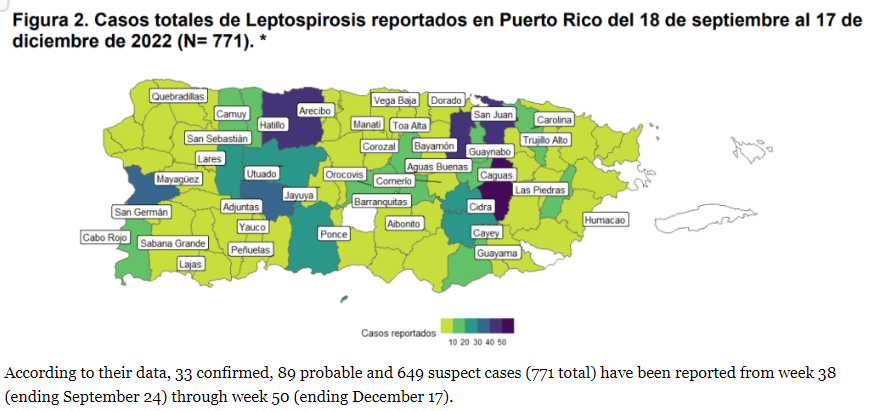SAN JUAN — The Puerto Rico Department of Health reports nearly 800 total (confirmed, probable and suspect) cases of leptospirosis in the aftermath of Hurricane Fiona on September 18, 2022, according to Outbreak News Today.
Their data shows 33 confirmed, 89 probable and 649 suspect cases (771 total) have been reported from week 38 (ending September 24) through week 50 (ending December 17).

The 771 cases were reported in 74 municipalities of all the health regions. The Health Region with the most reported total cases was Caguas (164). The The municipality with the highest number of total cases reported was Caguas (52). The municipality with the highest number of confirmed and probable cases was Utuado (8).
Currently, seven deaths are under investigation.
In all of 2022, Puerto Rico has seen 944 total cases of leptospirosis, including 14 fatalities.
Leptospirosis is an acute febrile disease with varied manifestations. The severity of the disease ranges from asymptomatic or subclinical to self-limited systemic disease (approximately 90 percent of patients) to a life-threatening disease with jaundice (yellowing of the skin, mucous membranes or eyes), kidney failure (oliguria or anuria), myocarditis, hemorrhage (particularly pulmonary), and refractory shock (organ damage).
Leptospirosis is a bacterial disease that can be contracted by coming into contact with water or soil containing urine or other body fluids from infected animals. There are several types of animals that can transmit leptospirosis such as: rodents, dogs, cattle, pigs, and wild animals.
This disease most frequently affects people who work outdoors free or with animals or those who participate in recreational activities in which they have contact with water or land such as swimming and gardening. After floods or torrential rains, all people who come in contact with flood water, or with soil or fresh water contaminated (rivers and streams) could be at risk of infection.
In Puerto Rico it is considered an endemic disease. However, in places with continuous exposure to contaminated water, the risk of infection is much higher.
Exposures associated with floods and natural disasters, which can include hurricanes and heavy rainy seasons, increase the risk of leptospirosis in the population.



